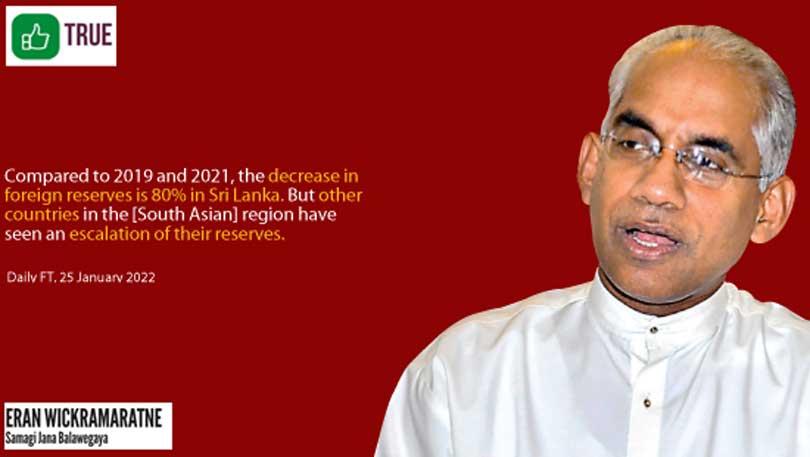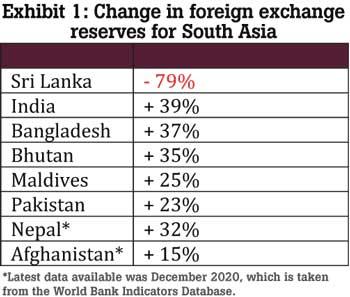24 Feb 2022 - {{hitsCtrl.values.hits}}

 In his statement, the MP compares foreign exchange reserves of the South Asian region between 2019 and 2021, and states that reserves declined in Sri Lanka by 80%, while the other countries recorded an increase.
In his statement, the MP compares foreign exchange reserves of the South Asian region between 2019 and 2021, and states that reserves declined in Sri Lanka by 80%, while the other countries recorded an increase.
To check the MP’s claim, FactCheck.lk consulted data presented by the Central Bank of Sri Lanka (CBSL), Central Banks of the relevant countries and the data presented in the World Bank Development Indicators database.
FactCheck.lk limited its comparison of foreign reserves across the South Asian countries at the end of November 2021. At the time of the statement, the month-end reserves for December 2021 were not yet published in more than half the other South Asian countries compared.
 Exhibit 1 shows the change in foreign exchange reserves in all South Asian countries from December 2019 to November 2021. During this period, Sri Lanka’s foreign exchange reserves have fallen by 79.2%, which is almost 80% as cited by the MP; while all the other South Asian countries have recorded an increase in their reserves.
Exhibit 1 shows the change in foreign exchange reserves in all South Asian countries from December 2019 to November 2021. During this period, Sri Lanka’s foreign exchange reserves have fallen by 79.2%, which is almost 80% as cited by the MP; while all the other South Asian countries have recorded an increase in their reserves.
Therefore, we classify the MP’s statement as TRUE.
NB. Sri Lanka’s reserves were reported to have increased somewhat by end of December 2021. However, the increase was a result of including currency stocks that don’t fit the international definition of reserves (Balance of Payments Textbook, International Monetary Fund). This increase in December 2021 is because the CBSL re-classified the pre-existing Yuan based Swap from China as reserves.
*FactCheck.lk’s verdict is based on the most recent information that is publicly accessible. As with every fact check, if new information becomes available, FactCheck.lk will revisit the assessment.
FactCheck is a platform run by Verité Research.
For comments, suggestions and feedback, please visit www.factcheck.lk.
22 Dec 2024 1 hours ago
22 Dec 2024 1 hours ago
22 Dec 2024 4 hours ago
22 Dec 2024 4 hours ago
22 Dec 2024 4 hours ago